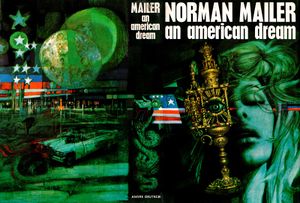An American Dream Expanded
During the spring semester of 2019, my graduate course, NMAC 5108 Writing and Publishing in Digital Environments, helped publish a Digital Humanities project. ”An American Dream Expanded, published on Project Mailer — an official web site of the Norman Mailer Society, collected, edited, and posted artifacts from the years surrounding the publications of Norman Mailer’s 1965 novel An American Dream. The major artifact was a 2004 collection Norman Mailer’s Letters on An American Dream, 1963–1969, edited by Mailer’s official biographer J. Michael Lennon.

Acting as editor, I gave students an overall format and organization, and they translated the book into a digital document using MediaWiki — the same software used by Wikipedia. This involved posting each letter (75 in all); editing, annotating, and linking each; formatting the overall project; and making the digital book work with the rest of the web site. In addition to the letters, students posted other documents and images that had to do with the publication and reception of An American Dream, like full-text scholarly essays and reviews, advertisements, various book covers, and other snippets that give insight into Mailer’s artistic and logistical processes.
One of the challenges of such a project is that there is no established format for a digital book — if that term is even germane for a project such as this. While this endeavor is certainly as scholarly and challenging as publishing a book, it adds the additional hurdle of presenting the information in such a what that it takes advantage of the the platform in a logical way that both utilizes the platform's strengths and mitigates the hurdles of access. I think the students have done a great job: it certainly helps that it looks like Wikipedia — a platform that most of us are used to using with greater frequency.
While this work is challenging, it is ultimately very rewarding. Several of the students, while overwhelmed at first with the twin tasks of learning the nuances of the wiki language and translating paper artifacts into a cohesive digital project, all were able to offer substantial additions to the project — most going above and beyond the class requirements to make AAD Expanded as strong, as useful, and as elegant as it could be. I am both proud and pleased of their collaborative commitment and effort to improve the quality of Project Mailer. As an educator in the digital age, I think this is exactly the kind of knowledge-building projects that much of higher education should emphasize, as it provides crucial digital literacies, promotes the continued importance of the Humanities, and allows students to realize the validity of their contributions as professionals.
Please have a look at Project Mailer’s latest Digital Humanities effort: “An American Dream Expanded.”
